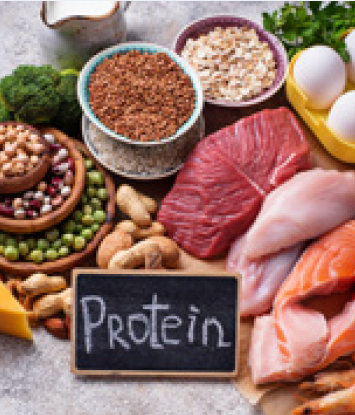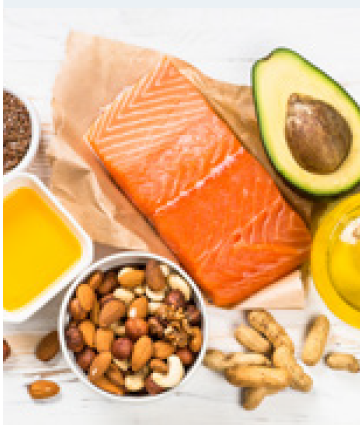The importance of a healthy diet for body and mind

A well-rounded and healthy diet is essential for overall well-being and vitality. Ideally, it supplies our bodies with the necessary nutrients for optimal functioning. Consuming a healthy diet can help us feel better, enhance our physical appearance, boost energy levels, potentially delay the aging process, and significantly lower the likelihood of chronic illnesses. Furthermore, the positive effects of healthy eating extend to mental health, as those who eat healthy diets exhibit greater resilience to daily stressors and a reduced risk of mental health conditions like depression and anxiety.
What does a healthy diet do to our minds?
The brain functions as a high-performance system and requires a diverse range of nutrients such as Omega-3 fatty acids, vitamin B12, folic acid, iron, and zinc for optimal operation. Inadequate intake of these nutrients can result in mood swings, irritability, and potentially lead to mental health disorders.
An imbalanced diet can trigger inflammation within the body, increasing susceptibility to mental health issues. Excessive consumption of sugary and processed foods can disrupt blood sugar levels, negatively impacting mood regulation.
However, adopting a diet rich in fruits, vegetables, whole grains, lean proteins, and healthy fats can enhance mental health and lower the risk of mental illnesses. Key considerations include:
- Consuming a diverse range of foods
- Prioritizing unprocessed foods
- Preparing meals at home for better control over ingredients
- Maintaining adequate hydration
- Limiting salt and sugar intake
- Reducing the consumption of stimulants, e.g., caffeine and alcohol
What is the best way to get all the nutrients?
This modular system can help you to eat a balanced diet and provide inspiration for meal choices, especially during stressful times or when your refrigerator is devoid of options.
The modular system for balanced meals
 Carbohydrates
Carbohydrates
Whole wheat pasta
Brown rice
Potatoes
Whole wheat/grain bread
Oats
Ancient grains
 Proteins
Proteins
Legumes
Tofu
Eggs
Meat
Fish
Nuts/Nut butters
Yogurt/Quark
 Fats
Fats
Seed oils / Rapeseed oil
Soy oil / Olive oil
•Nuts / Nut butters
Fatty fish
Avocado
 Fruits & Veggies
Fruits & Veggies
Green vegetables
Leafy greens
All cabbage varieties
Squash
Apples, pears
Bananas, berries
An ideal meal should encompass all elements of a balanced diet. While fats, proteins, and carbohydrates should be consumed in moderation, there are practically no restrictions on the intake of fruits and vegetables. It is important to note that not every meal needs to include all food groups. Additionally, the recommended foods are merely examples within their respective categories and are not mandatory for a healthy diet. For instance, ancient grains like millet, green spelt, and spelt are popular choices for carbohydrates and provide a valuable source of energy.
Healthy eating in everyday life – a few practical tips
Maintaining a healthy diet should be practical for everyday life. It can be challenging to resist cravings and make optimal choices, especially when dining out with colleagues or while traveling. Here are some useful suggestions:
Eating in the office or on the go
Preparation is key. To avoid unnecessary consumption of fast food or stress-induced impulse purchases, it can be helpful to plan ahead. Prepare your meals the night before and aim to eat at regular intervals. It is important to note that meal replacement products, such as powdered mixes or ready-to-drink options, are not intended for daily consumption and are not a substitute for a balanced meal!
Eating in a restaurant
Before going to a restaurant, ask yourself: What do I want to eat? Only then should you decide where to eat. It can be a good idea to drink a lot before eating to curb the initial feeling of hunger. Opt to prepare your salad dressing with oil and vinegar to avoid sugary dressings. Skip bread before your meal and choose a protein-rich main course. Avoid fried or breaded dishes and replace the side dish with grilled vegetables or a side salad.
Ideas for in-between meals
While excessive snacking should be limited, occasional sweet or savory treats can be enjoyed to boost our energy during busy days. Replace your office snack stash with a few healthier alternatives, such as fresh fruits and veggies with homemade dips, nuts or trail mix, plain yogurt with fruit or nuts, homemade energy balls, granola bars, or the occasional smoothie.
Nobody is perfect!
It is completely normal to indulge occasionally and deviate from a perfectly balanced diet. We would just like to give you a few valuable tips along the way. It is essential to be mindful of your dietary choices and consider factors such as existing health conditions and intolerances. Reflect on your eating habits: Are they beneficial for your well-being? Are you consuming food too late, too quickly, or in excessive amounts? Evaluate the emotions involved in your eating habits and ensure that your dietary choices align with your lifestyle.
What does my body need?
Vitamins: to maintain healthy bodily functions
Minerals: for healthy teeth, bones and muscles
Dietary fiber: for the digestive system
Water: for good hydration levels
Carbohydrates: for energy
Proteins: for growth and repair
Healthy fats: for the hormones
